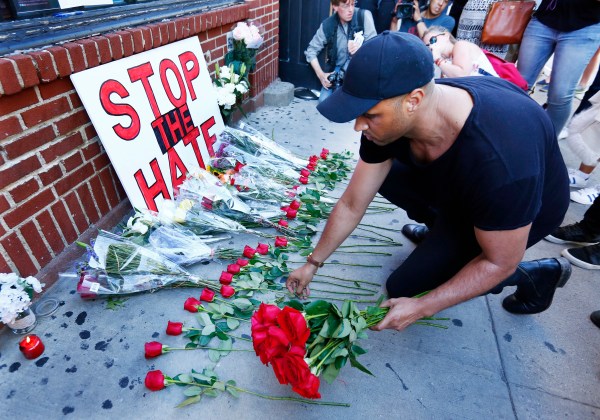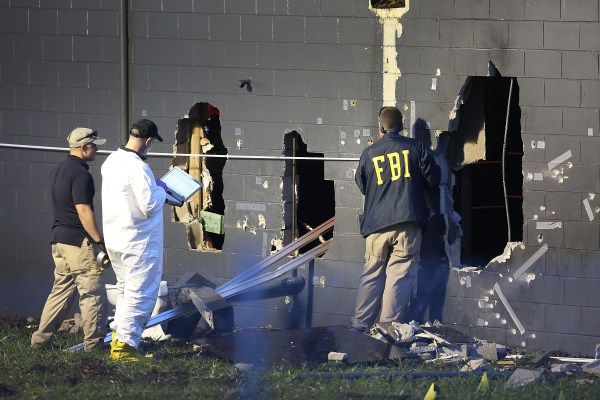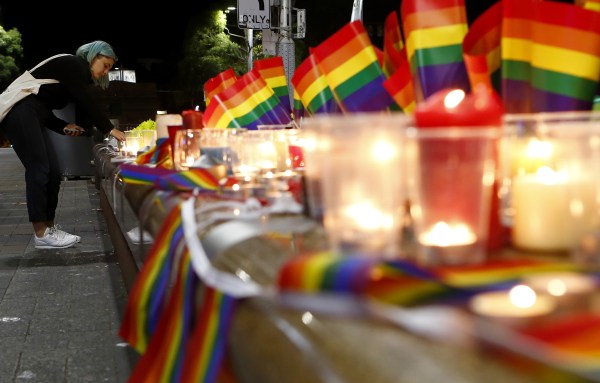There is, in 2016, a well-meaning but misguided belief that it’s safe to be LGBT+ in America. Increased representation in the media, major legal decisions, and a huge outcry against bigotry on the progressive Internet have all contributed to an overall sense that hate and violence based on sexual orientation and gender identity will soon be things of the past. But whatever safety members of the LGBT+ community may have felt before the devastating shooting at Orlando’s Pulse nightclub over the weekend, it’s just been shaken to its core.
That’s not just because the shooting was a hate crime; it’s because it was a tragic outgrowth of the deeply-entrenched negative attitudes many people still hold toward those who identify as gay, lesbian, bi-sexual, or transgender. It was a sign that while many people hold the Fred Phelps, Kim Davises, and Antonin Scalias of the world as vanishing relics of old-timey bigotry, there’s still an overwhelming amount of work ahead before the LGBT+ community is fully accepted.
The assertion that gay, lesbian, and transgender men and women are still victims of hate crimes in 2016 isn’t a hollow one. According to The Atlantic, The Southern Law Poverty center found that “LGBT people are more than twice as likely to be the target of a violent hate-crime than Jews or black people.” FBI Statistics for 2013 reveal that of the over 5,000 incidents of “single bias” hate crimes that occurred that year, 20.8 percent were perpetrated due to the victim’s sexual orientation. In 2014, that number went down to 18.6 percent. In 2016, that number seems likely to go back up. The shooting at Pulse may be the largest such tragedy, but it’s far from the only one. In March, two men in Atlanta had boiling water poured on them by a man enraged by their sexual orientation. On June 12, the same day the shooting occurred in Orlando, police arrested a man on his way to LA Pride with a car full of automatic rifles and explosives.
Protections against such hate crimes, particularly those targeting the LGBT+ community are also relatively new. The Matthew Shepard and James Byrd Jr. Hate Crimes Prevention Act, which added sexual orientation, gender identity, and disability as protected classes when it comes to hate crimes, wasn’t passed without hardship. 19 senators and 95 representatives who opposed the extension of these protections are still in office today.

As a gay man, one living in San Francisco, it’s easy to forget just how swiftly hatred can flow. I encounter bold-faced bigotry — someone calling me a “faggot” on the street, or mockingly singing “only in San Francisco” as my husband and I hold hands — extremely rarely. It’s easy to ignore and easy to treat as an anomaly.
So are the less overt assertions of heterosexism. When one of my students told me I’d “be a really great teacher once I stopped talking about all that gay stuff,” I was more perplexed than anything else. He’d clearly meant it as a compliment, and it was much easier to let it roll off my back than to hurt his feelings by letting him know that the “gay stuff” — casual mentions of my husband that would go unnoticed if I’d been speaking about a heterosexual relationship — were a normal part of my identity.
The events of this weekend are a cruel reminder that the sexual orientation of myself, the people I know, and millions just like us, is political and it needs to continue being visible in order for society to progress. You can’t blame LGBT+ people for occasionally wanting to disassociate from this visibility, though. It’s often sanity-saving. When you think “something like this can’t happen here,” you’re telling yourself that you’re safe and assuring yourself that there’s really no reason to worry. As Alex Frank writes on The Fader, “nightclubs are church.” They’re (deceptively) safe spaces where “entire lives are lived” and people of all kinds can get together knowing that they’ll be protected in their own little enclave — a building, room, or themed night where those who are disenfranchised can make connections, feel included, and just live.
What do you do when that sanctity is shattered? How do you cope when a place that you may have traveled hundreds of miles to visit just for a few breathless hours of being yourself — because you can’t do it at home, at work, or around your family — becomes ground zero for the very thing you fear?
There are two ways to think:
The first — which could (could) provide a lifetime of safety and shouldn’t be judged — is to turn off the TV and realize that now is not “our time.” You might avoid gay nightclubs, try to assimilate more than ever, and, even if you’re out, try to present a non-threatening face to the world. It’s not an apology for your identity, but a sort of sheepish hiding in plain sight. It’s a tactic I once employed regularly, introducing my husband as quickly as possible before moving on to another topic, paying lip service to being out while teaching, gauging the climate of the lecture hall in order not to make anyone else uncomfortable because I’m just one of those people who says “girl” a lot.
It’s an unconscious struggle, but one that’s exhausting when you look back and think of how carefully you tried not to present as a stereotype, so that your behavior wasn’t used as information to pass judgment on the many people you happen to share a sexual orientation with. For so many, there’s no other choice. Just surviving requires immense courage.
The second coping method is to remember that pride, equality, and the freedom to be as open as you want to be (which can run the gamut from very private to very flamboyant) wasn’t just granted to the LGBT+ community out of the goodness of everyone’s hearts. It wasn’t a mass majority that decided that people should be allowed to marry members of the same sex if they so wished. And it’s not a group of fair and just elected officials that’s spurring acceptance of trans people being allowed to use bathrooms congruent to their gender. It’s people within the community (and their allies) putting faces to the labels and making sure that “the gays” aren’t a faceless monolith here to take privilege and liberty from those who have always had it, but people just like anyone else. People deserve to be heard and to express themselves in the ways that they see fit, whether that means keeping their private life private — a choice, not a mandate for acceptance — or walking into the club purse first.
Things have changed for the better, of course. Sara David, writing for Complex, points out that the fight for LGBT+ rights has created a crashing wave, if not a sea change. The Stonewall Riots of 1969, which saw members of the gay, lesbian, and trans communities stand up against violence and injustice (being arrested for using the “wrong” bathroom was a factor then, too) has given rise to a nationwide movement of changing views. That progress, though, has come at a cost, and often at the expense of innocent lives. While it’s important to acknowledge the achievements — the steady strive towards equality — it’s just as important to note that many things have remained static.
LGBTQ youth are four times more likely to attempt suicide than their straight peers. In the first five months of 2016, murders of 10 trans people in America were reported. According to the Advocate, “Almost all of the victims were people of color, and the vast majority were black transgender individuals.” If the Stonewall procedures sound eerily like what’s happening with today’s anti-trans bathroom bills, it’s because they’re exactly the same. These instances compounded by the mass shooting in Orlando are terrorism in its broadest definition—the use of violence and intimidation in the pursuit of political aims.
It’s senseless to argue whether the Orlando gunman was a terrorist (he was, and it has everything to do with the group he targeted during LGBT History Month), and it’s naive to think that the same homophobic rhetoric that was spouted when 32 people were killed by an arsonist at The Upstairs Lounge in 1973 won’t be applied to the shooting at Pulse. Some things will be different: memorial services will be held without the fear that no church would allow it, people in critical care won’t be fired due to their sexual orientation while still in the hospital, and radio hosts may not be making jokes about burying the dead in “fruit jars.” But there’s already no shortage of people who are claiming that what happened wasn’t a mistake. They include Texas’ Lt. Governor, Dan Patrick, who tweeted and deleted a bible verse about people mocking god “reaping what they sow” only minutes after news of the Orlando shooting broke, and less prominent individuals adding entries to the endless treasuries of anti-gay hate speech — “I’m so happy someone decided to shoot perverts instead of innocent people.”

This is why we can’t just accept the progress that’s been made and must keep pushing forward — not to “take over the world and bend others to the will of the gay agenda” as some might see it, but to be respected as human beings whose mere existence isn’t seen as a collection of rights and liberties being taken away from someone else.
In order for progress to continue, the push for more visibility has to continue. It’s more important than ever that Pride continues to happen; that LGBT history month isn’t just something to tolerate, but to support; that the accomplishments of gay, lesbian, and transgender individuals are taught; and that the grave injustices against minority groups be reported, discussed, and used as educational tools so that we diminish the dividends of oppression and bigotry. Members of the LGBT+ community and their supporters should be vigilant, yes, but we shouldn’t take this shooting as a reason to stop existing. Nor should we settle for surviving. As Sara David notes, the LGBT+ community should flourish.
Flourishing won’t always be easy; it won’t always be a rainbow emoji and a pin that says “Gay? Hooray.” And it can’t just be a cry into an echo chamber of support, no matter how good and safe it may feel. Flourishing doesn’t mean outing ourselves — especially in the face of real danger — or outing others. But it does mean having difficult conversations, celebrating ourselves even when it feels like there are too many scary people fighting against us, and standing up for people who have been marginalized, disenfranchised, and violated.
When I got married earlier this year, my husband and I traveled to Kentucky to obtain our marriage license from the registrar’s office over which Kim Davis presides. Our decision to get married there was a stand, yes, but it was also driven by a keen interest in understanding the reality in which so many LGBT+ people, those who don’t reside in vast metropolitan bubbles of acceptance, navigate their everyday lives. One woman I spoke to, a local who asked to be identified by the pseudonym ‘Liz,’ cried when she told me how unfair it is that she couldn’t stand up for her friends (who had given their blessing for her to support them in secret) because she feared losing her job.
“It’s not that I want to stand anonymous,” she said, “but I don’t have anything to fall back on. My job is the only job that I can get in Morehead. My friends know that. They told me, ‘You have to do what you have to do. So don’t worry about us.’ I’ve cried a lot about that and I’m not very religious, but I do actually pray about it sometimes. I may not want to put my face out there, but if something was ever to lay harm on them I would be the first person to stand in the way and take it for them.”
That harm came to Orlando’s LGBT+ community this week. It’s time for all of us to stand with them.







